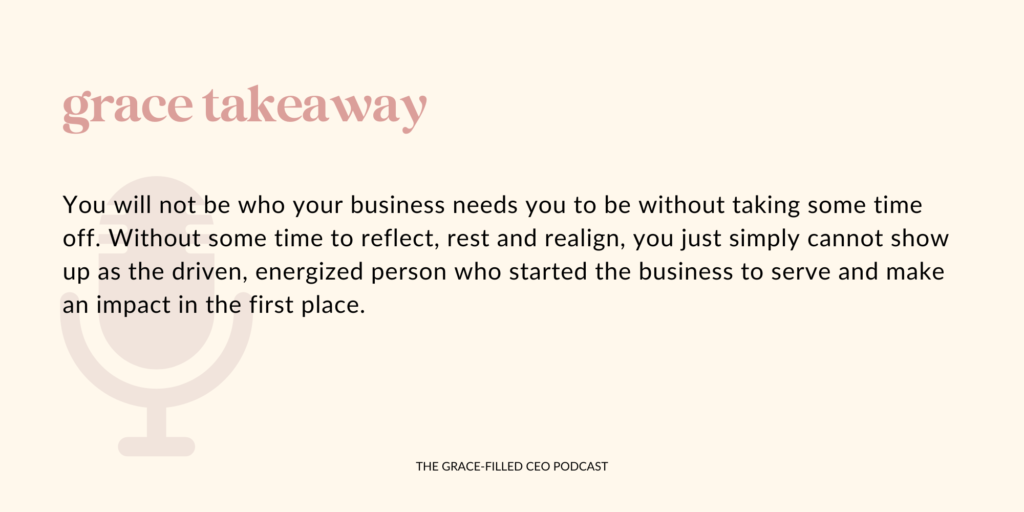![Taking Time Off as an Entrepreneur and Coming Back Taking Time Off as an Entrepreneur: How to Prepare and Return Refreshed [Ep 18]](https://jilliandolberry.com/wp-content/uploads/2022/08/TGFCEO-Podcast-Blog-Graphics-1024x512.png)
Taking Time Off as an Entrepreneur: How to Prepare and Return Refreshed [Ep 18]
Start Listening! 🎧
Welcome to The Grace-Filled CEO Podcast. Today, we're diving into a crucial topic for entrepreneurs: how to take time off from your business without the stress and overwhelm that often follows. As we navigate the ever-changing landscape of entrepreneurship in 2024, it's more important than ever to prioritize rest and rejuvenation.
Why Taking Time Off Matters
When was the last time you truly disconnected from your business? Not just a holiday where you sneaked peeks at your inbox, but a real break. As entrepreneurs, especially those who are the primary income earners for their families, the pressure to always be “on” can be intense. However, without regular periods of rest and reflection, we can't show up as the driven, energized people who started our businesses to make an impact.
Preparing for Time Off
Start by asking yourself: “What has to be true for me to take off from my business?” Whether you're planning a week-long vacation or a months-long sabbatical, this question will help you identify your needs and concerns.
Key Considerations:
- Team preparation
- Financial planning (refer to Episode 17 for detailed advice)
- Creating a plan to step away without being pulled back in
Having a Plan and Tracker
To avoid feeling overwhelmed when returning to work, create a comprehensive plan and tracking system. This is crucial whether you have a team or you're a solopreneur.
For Teams:
- Outline the plan in a shared document
- Use a central task management system (ClickUp is excellent for this)
- Establish clear priorities for team members
- Create a space for team meetings without you
- Designate an emergency point of contact
For Solopreneurs:
- Decide what can continue in your absence
- Set up automations and workflows
- Use tools like Zapier, Dubsado (20% off with our link), and Flodesk (50% off for our listeners) to keep things running
New Tip: Consider using AI tools to help manage routine tasks or customer inquiries while you're away. Chatbots or AI-powered email responders can handle basic questions, ensuring your clients feel supported even in your absence.
Managing Notifications
Choose one channel for emergencies and turn off all other notifications. This step is crucial for truly disconnecting and avoiding the temptation to “check in.”
New Tip: Use a digital wellbeing app to track and limit your screen time, especially for work-related apps, during your time off.
How To Write Out Of Office Message
Your out-of-office message is crucial for setting expectations and maintaining professional relationships while you're away. Here are some tips for crafting an effective message:
- Be Clear and Concise: State the dates you'll be away and when you'll return.
- Set Expectations: Mention how often (if at all) you'll be checking messages.
- Provide Alternative Contacts: If urgent matters arise, give the name and contact information of a team member who can help.
- Add a Personal Touch: A brief mention of why you're out (vacation, conference, etc.) can add a human element.
- Consider Auto-Responders: Set up automatic responses for different platforms (email, social media, etc.)
Example:
“Thank you for your message. I am out of the office from [Start Date] to [End Date] and will have limited access to email. If you need immediate assistance, please contact [Colleague's Name] at [Contact Info]. For non-urgent matters, I'll respond to your message upon my return. Thank you for your understanding, and have a great day!”
New Tips for Preparing to Be Out of Office
- Create a Re-Entry Plan: Before you leave, outline tasks and priorities for your first few days back. This will help you ease back into your work routine without feeling overwhelmed.
- Schedule a Buffer Day: If possible, plan to return one day before you officially start work. Use this day to catch up on emails and get organized.
- Use Project Management Tools: Implement a system like Asana or Trello to keep track of ongoing projects and their status while you're away.
- Prepare Your Clients: If you work directly with clients, inform them of your absence well in advance and set clear expectations for communication during this time.
- Automate Social Media: Use tools like Hootsuite or Buffer to schedule social media posts during your absence to maintain your online presence.
Returning to Work
When you return, resist the urge to dive straight into your inbox. Instead, start with your tracker or project management tool to get a clear overview of what's happened in your absence. This approach will help you prioritize effectively and avoid feeling overwhelmed.
Remember, taking time off is not just a luxury; it's a necessity for maintaining your creativity, productivity, and overall well-being as an entrepreneur. By implementing these strategies, you can enjoy your time off with peace of mind, knowing that you've set yourself and your business up for success.
If you need help planning your time off or want to discuss strategies tailored to your business, consider booking a strategy session with us. We're here to support you in creating a thriving business that also allows for essential rest and rejuvenation.
Remember, you've got this! Taking time off is not only possible but essential for your long-term success and happiness as an entrepreneur. Here's to creating a business that supports your life, not the other way around.
Resources:
- Get 50% off of Flodesk
- Get 20% off of Dubsado
- Get ClickUp
- Ep 17: Be Financially Prepared to Take Time Off in Your Business with Madison Brown
- Jillian Dolberry’s website

Be sure to subscribe wherever you listen to podcasts or at www.jilliandolberry.com/podcast. You can also continue the conversation with me on Instagram at @jilliandolberry.
+ view comments . . .